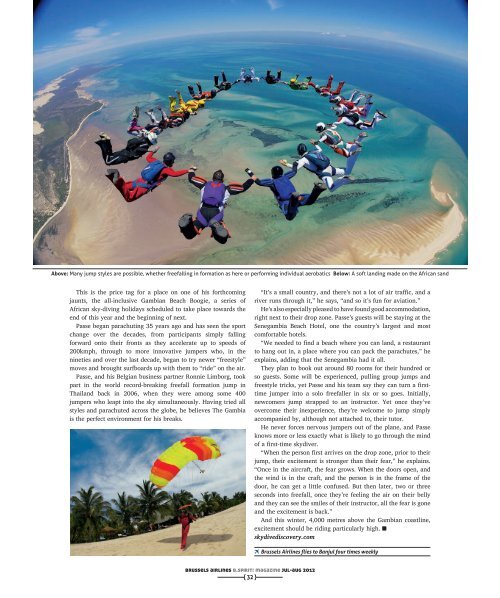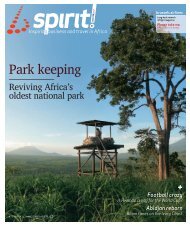july-2012
july-2012
july-2012
Create successful ePaper yourself
Turn your PDF publications into a flip-book with our unique Google optimized e-Paper software.
Above: Many jump styles are possible, whether freefalling in formation as here or performing individual aerobatics Below: A soft landing made on the African sand<br />
This is the price tag for a place on one of his forthcoming<br />
jaunts, the all-inclusive Gambian Beach Boogie, a series of<br />
African sky-diving holidays scheduled to take place towards the<br />
end of this year and the beginning of next.<br />
Passe began parachuting 35 years ago and has seen the sport<br />
change over the decades, from participants simply falling<br />
forward onto their fronts as they accelerate up to speeds of<br />
200kmph, through to more innovative jumpers who, in the<br />
nineties and over the last decade, began to try newer “freestyle”<br />
moves and brought surfboards up with them to “ride” on the air.<br />
Passe, and his Belgian business partner Ronnie Limborg, took<br />
part in the world record-breaking freefall formation jump in<br />
Thailand back in 2006, when they were among some 400<br />
jumpers who leapt into the sky simultaneously. Having tried all<br />
styles and parachuted across the globe, he believes The Gambia<br />
is the perfect environment for his breaks.<br />
brussels airlines b.spirit! magazine jul-aug <br />
{ 32 }<br />
“It’s a small country, and there’s not a lot of air traffic, and a<br />
river runs through it,” he says, “and so it’s fun for aviation.”<br />
He’s also especially pleased to have found good accommodation,<br />
right next to their drop zone. Passe’s guests will be staying at the<br />
Senegambia Beach Hotel, one the country’s largest and most<br />
comfortable hotels.<br />
“We needed to find a beach where you can land, a restaurant<br />
to hang out in, a place where you can pack the parachutes,” he<br />
explains, adding that the Senegambia had it all.<br />
They plan to book out around 80 rooms for their hundred or<br />
so guests. Some will be experienced, pulling group jumps and<br />
freestyle tricks, yet Passe and his team say they can turn a firsttime<br />
jumper into a solo freefaller in six or so goes. Initially,<br />
newcomers jump strapped to an instructor. Yet once they’ve<br />
overcome their inexperience, they’re welcome to jump simply<br />
accompanied by, although not attached to, their tutor.<br />
He never forces nervous jumpers out of the plane, and Passe<br />
knows more or less exactly what is likely to go through the mind<br />
of a first-time skydiver.<br />
“When the person first arrives on the drop zone, prior to their<br />
jump, their excitement is stronger than their fear,” he explains.<br />
“Once in the aircraft, the fear grows. When the doors open, and<br />
the wind is in the craft, and the person is in the frame of the<br />
door, he can get a little confused. But then later, two or three<br />
seconds into freefall, once they’re feeling the air on their belly<br />
and they can see the smiles of their instructor, all the fear is gone<br />
and the excitement is back.”<br />
And this winter, 4,000 metres above the Gambian coastline,<br />
excitement should be riding particularly high.<br />
skydivediscovery.com<br />
Brussels Airlines flies to Banjul four times weekly











